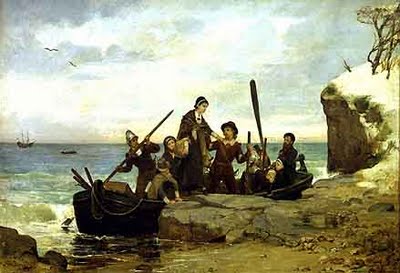
Online Texts for Craig White's Literature Courses
|
from Chapter Thirteen.
[Indian trade; |
|
Instructor's Summary of Chapter 12:
![]() Squanto and Hobomock,
Indians associated with the Pilgrims, conspire against
each other and maybe against the Pilgrims, revealing a little of continuing
Indian life despite recent catastrophes.
Squanto and Hobomock,
Indians associated with the Pilgrims, conspire against
each other and maybe against the Pilgrims, revealing a little of continuing
Indian life despite recent catastrophes.
![]() Different Pilgrim officers play friends with Squanto and
Hobomock to learn what they can about Indian plans.
Different Pilgrim officers play friends with Squanto and
Hobomock to learn what they can about Indian plans.
![]() Squanto uses his association with the Pilgrims to gain
power among the Indians and usurp Massasoit's power.
Squanto uses his association with the Pilgrims to gain
power among the Indians and usurp Massasoit's power.
![]() On a diplomatic mission with Bradford, Squanto dies of an "Indian fever," with
his last words asking for prayers that he be accepted into the Pilgrims' heaven.
On a diplomatic mission with Bradford, Squanto dies of an "Indian fever," with
his last words asking for prayers that he be accepted into the Pilgrims' heaven.
![]()
Anno 1622
[¶13.1] At the spring of the year they had appointed [scheduled] the Massachusetts [Indian people] to come again and trade with them, and began now to prepare for that voyage about the later end of March. But upon some rumors heard, Hobomok, their [the Pilgrims'] Indian, told them upon some jealousies he had, he feared they [the Massachusetts] were joined with the Narragansetts [hostile tribe] and might betray them [the Pilgrims] if they were not careful. He [Hobomok] intimated also some jealousy of Squanto, by what he gathered from some private whisperings between him and other Indians.
[¶13.2] But they [Pilgrim trading party] resolved to proceed, and sent out their shallop [boat] with ten of their chief men about the beginning of April, and both Squanto and Hobomok with them, in regard of the jealousy between them. But they had not been gone long, but an Indian belonging to Squanto’s family came running in seeming great fear, and told them that many of the Narragansett, with Corbitant, and he thought also Massasoit, were coming against them [the Puritans]; and he got away to tell them, not without danger. And being examined by the Governor, he made as if they were at hand [close by], and would still be looking back, as if they were at his heels. At which the Governor [Bradford] caused them to take arms and stand on their guard, and supposing the boat to be still within hearing (by reason it was calm) caused a warning piece or two to be shot of, the which they [trading party on boat] heard and came in. But no Indians appeared; watch was kept all night, but nothing was seen. Hobomok was confident for Massasoit, and thought all was false; yet the Governor caused him [Hobomok] to send his wife privately, to see what she could observe (pretending other occasions), but there was nothing found, but all was quiet. After this they proceeded on their voyage to the Massachusetts, and had good trade, and returned in safety, blessed be God.
[¶13.3] But by the former passages, and other things of like nature, they began to see that Squanto sought his own ends, and played his own game, by putting the Indians in fear, and drawing gifts from them to enrich himself; making them believe he could stir up war against whom he would, and make peace for whom he would. Yea, he made them believe they kept the plague [that killed many Indians in previous years] buried in the ground, and could send it amongst whom they would, which did much terrify the Indians, and made them depend more on him, and seek more to him then to Massasoit, which procured him envy, and had like to have cost him his life. For after the discovery of his practices, Massasoit sought it both privately and openly; which caused him [Squanto] to stick close to the English, and never dared go from them till he died. They also made good use of the emulation [competition?] that grew between Hobomok and him, which made them carry more squarely. And the Governor seemed to countenance the one, and the Captain the other, by which they had better intelligence, and made them both more diligent. . . .
[¶13.4] This summer they [the Pilgrims at Plymouth] built a fort with good timber, both strong and comely, which was of good defense, made with a flat roof and battlements, on which their ordnance [artillery] were mounted, and where they kept constant watch, especially in time of danger. It served them also for a meeting house, and was fitted accordingly for that use. It was a great work for them in this weakness and time of wants; but the danger of the time required it, and both the continual rumors of the fears from the Indians here, especially the Narragansetts, and also the hearing of that great massacre in Virginia, made all hands willing to dispatch the same. [In 1622 in the English settlements of Virginia the Powhatan Indians (the people of Pocahontas) mounted a major effort to drive out the English settlers.]
[¶13.5] Now the welcome time of harvest approached, in which all had their hungry bellies filled. But it arose but to a little, in comparison of a full year’s supply; partly by reason they were not yet well acquainted with the manner of Indian corn, (and they had no other,) also their many other employments, but chiefly their weakness for want of food, to tend it [the Indian corn] as they should have done. Also much was stolen both by night and day, before it became scarce eatable, and much more afterward. And though many were well whipped (when they were taken) for a few ears of corn, yet hunger made others (whom conscience did not restrain) to venture. So as it well appeared that famine must still ensue the next year also, if not some way prevented, or supply should fail, to which they dared not trust. Markets there was none to go to, but only the Indians, and they had no trading commodities. . . .
[Death of Squanto]
[¶13.6] Shortly after harvest Mr. Weston’s people [another nearby English colony] who were now seated at the Massachusetts [that is, visiting this people], and by disorder (as it seems) had made havoc of their provisions, began now to perceive that want would come upon them. And hearing that they hear had bought trading commodities and intended to trade for corn, they write to the Governor and desired they might join with them, and they would employ their small ship in the service; and further requested either to lend or sell them so much of their trading commodities as their part might come to, and they would undertake to make payment when Mr. Weston or their supply, should come. The Governor condescended upon equal terms of agreement, thinking to go about the Cape to the southward with the ship, where some store of corn might be got.
[¶13.7] All things being provided, Captain Standish was appointed to go with them, and Squanto for a guide and interpreter, about the latter end of September; but the winds put them in again, and putting out the second time, he [Captain Standish] fell sick of a fever, so the Governor [Bradford] went himself. But they could not get about the shoals of Cape Cod for flats and breakers, neither could Squanto direct them better, nor the master durst venture any further, so they put into Manamoyick Bay and got what they could there. In this place Squanto fell sick of an Indian fever, bleeding much at the nose (which the Indians take for a symptom of death), and within a few days died there; desiring the Governor to pray for him, that he might go to the Englishmen’s God in heaven, and bequeathed sundry of his things to sundry of his English friends, as remembrances of his love; of whom they had a great loss.
End Chapter 13



